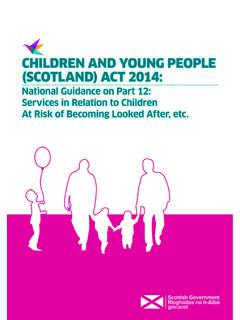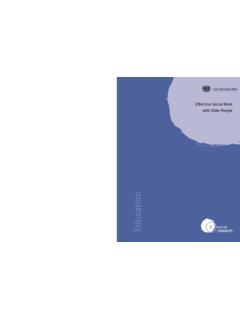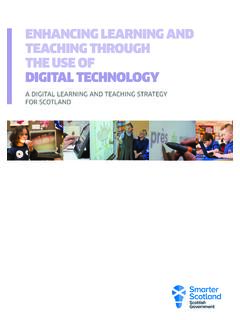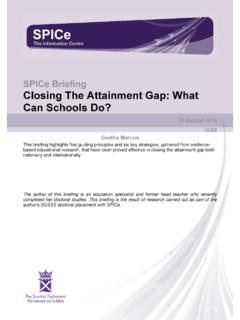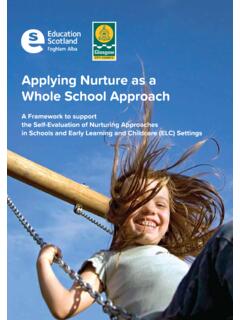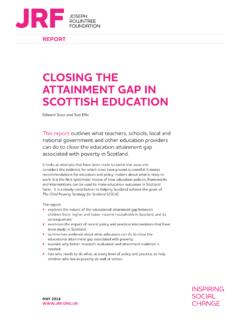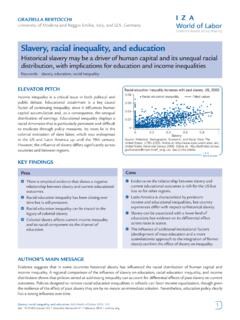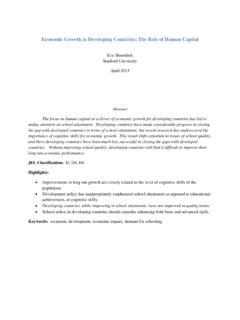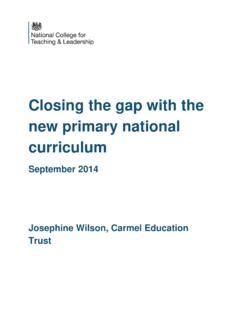Transcription of Achieving Excellence and Equity - Scottish Government
1 Achieving Excellence and Equity2021 National Improvement Frameworkand Improvement PlanDecember 2020 The ICEA feels that Scottish education exhibits many strengths. It values Equity as well as Excellence . It has an excellent standing internationally. It is investing effort and resources to narrow attainment gaps, working with and strengthening the teaching profession. International Council of Education Advisers, December 2020 2 Contents The 2021 National Improvement Framework and Improvement and Recovery Plan 1. Foreword 2. Introduction, vision and key priorities 3. Our vision for education in Scotland 4. The response of the Scottish education system to COVID-19 5. Education recovery in 2020/21 6. Delivering improvement 7.
2 Measuring the attainment gap 8. Drivers of improvement: what the evidence is telling us and the action we will take School leadership Teacher professionalism Parental engagement Assessment of children s progress School improvement Performance information 9. Conclusion Annex A - Summary of ongoing and completed activity from the 2020 Improvement Plan Annex B - References and useful links 3 Foreword This has been a year like no other. Our response to COVID-19 has demonstrated the collective strengths of our education system, as we worked together to mitigate the worst impacts of the pandemic on our learners. The positive values and ethos of Scottish education, and especially the shared commitment of Equity , has been essential this year.
3 This underpinned the quick action that local authorities took in March to establish the hubs which provided support to the most vulnerable young people and the children of key workers. It was no surprise to me that so many of our dedicated school staff volunteered to work in the hubs to provide that support in the most unsettling of times. And I know how hard teachers worked to support their pupils and deliver remote learning while schools were closed. The commitment of school leaders to reopen schools to all pupils in August, and to keep them safe, open and welcoming has been remarkable. All school staff have worked tirelessly throughout to continue to provide a high quality and rewarding learning environment and experience.
4 I remain deeply grateful to each and every one of them. I also want to pay tribute to our children and young people. Their energy and resilience to overcome the challenges of school closures and wider restrictions has been hugely impressive. I believe that Curriculum for Excellence , with its focus on breadth of learning and individual development, has helped Scotland s young people adapt to these changed circumstances this year. On a related note, Scotland s score in the PISA global competency assessment where we ranked fourth across all participating nations - demonstrates the progress that Scotland has made in supporting young people to be well-informed and effective global citizens, and reflects the values set out in CfE.
5 Education recovery will be key in the year ahead, with a continued focus on health and wellbeing, as well as intensified support for reducing inequity and enabling the highest quality of learning and teaching. This year s Improvement Plan, therefore, reflects this recovery agenda and sets out the action we will take over the coming year to redress the impact of 2020 on our young people. It is, as ever, informed by input from the International Council of Education Advisers, who have detailed knowledge and understanding of how others across the world are looking to address these challenges and what is working well. The outputs from our forthcoming Equity Audit will further improve our understanding of the targeted and specific action that is needed to offset the impact on those who may have been most affected by the pandemic.
6 I have no doubt that 2021 will also bring challenges, but I am confident that our young people and our schools will continue to rise to those challenges and that it will be another successful year for Scottish education. John Swinney MSP Deputy First Minister and Cabinet Secretary for Education and Skills December 2020 4 Introduction, vision, and key priorities Introduction Background The 2021 National Improvement Framework (NIF) and Improvement Plan replaces last year s NIF and Improvement Plan. Together with the National Improvement Framework Interactive Evidence Report, the NIF has improved the availability, quality and consistency of data, and extended understanding of what works to drive improvements for children and young people across all parts of the Scottish education system.
7 It sets out the vision and priorities for Scottish education that have been agreed across the system, and the national improvement activity that needs to be undertaken to help deliver those key priorities. This complements the ongoing implementation of Curriculum for Excellence (CfE), Getting It Right for Every Child (GIRFEC), and Developing the Young Workforce (DYW), which are the three supporting pillars of the Scottish education system. Scottish Ministers have a statutory duty, introduced by the Education (Scotland) Act 2016, to review the NIF and publish a plan on an annual basis. As part of the review, we provide education authorities, teachers, young people, and parents with the opportunity to express their views, and these have been taken into account in the drafting of this year s NIF and Improvement Plan.
8 Context This has, indisputably, been a unique and difficult year. Barely three months after we had set out the priority improvement activities in the 2020 NIF and Improvement Plan, school buildings had closed and Scotland was dealing with the impact of a global pandemic. As a result, the Scottish education system had to react quickly, and decisively, and focus on ensuring that the business of teaching and learning continued, even while the majority of school buildings were closed. This meant that we had to review the focus of our activity, and place recovery and support to the education system at the heart of all our activities. The COVID-19 pandemic has introduced unprecedented levels of uncertainty for people and education systems and, as a result, the review process in Autumn 2020 produced a clear consensus that broad stability in the NIF priorities and drivers of improvement was desirable.
9 Equally, it will be important to ensure that the NIF reflects those changing priorities that have come about as a result of COVID-19, as well as reporting on the progress that was made to implement the improvement activities up to 20 March (when the school buildings closed). In particular, it is important that the NIF and Improvement Plan captures the recovery and support work that is being undertaken to deal with the educational impact of the COVID-19 crisis into 2021 and beyond. A number of issues were raised during the review, including the need to focus on recovery, on providing certainty in a world where very little feels secure, and to ensure support is provided to those who need it most.
10 There was also support for an increased focus on health and wellbeing, in particular the measures being taken to support the health and wellbeing of children and young people, and of staff, in the light of COVID-19. There should also be more emphasis placed on the needs of children and young people with additional support needs something which has been identified and addressed via the actions that came out of Angela Morgan s review of implementation of additional support for learning, and which are reflected in the improvement actions set out under each driver. 5 International Council of Education Advisers The Deputy First Minister held a series of meetings with the International Council of Education Advisers (ICEA) in the period since the schools closed in March, in order to consider international approaches responding to the pandemic, and to see if there were any lessons Scotland could learn from other countries.

